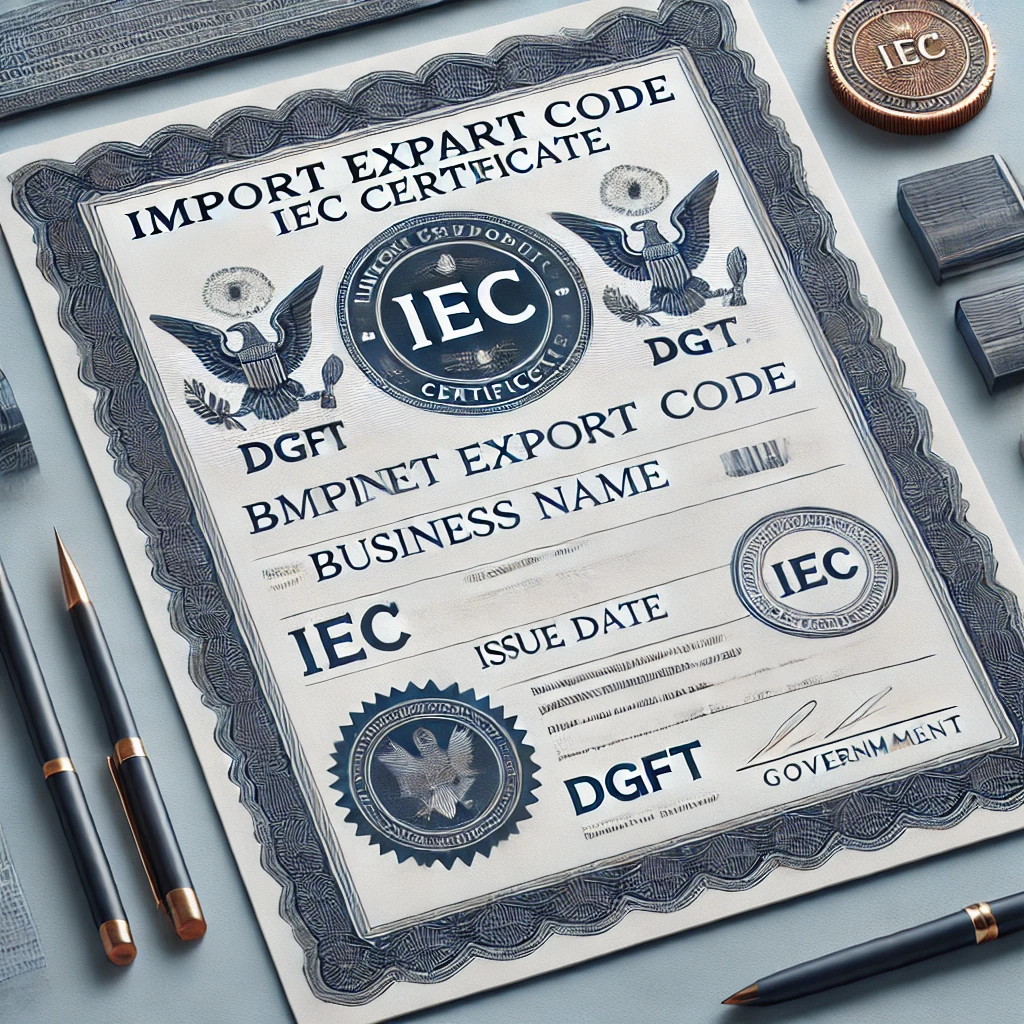Table of Contents
ToggleHow to Register for Import Export Code (IEC)
Introduction
The Import Export Code (IEC) is a crucial business identification number for any company or individual engaging in import and export activities in India. Issued by the Directorate General of Foreign Trade (DGFT), IEC is a 10-digit code that facilitates international trade. Without it, businesses cannot legally import or export goods and services.
This guide provides a step-by-step approach to registering for an IEC, detailing the eligibility criteria, required documents, application process, benefits, and post-registration compliance.
Understanding the Importance of IEC
The IEC plays a significant role in simplifying international trade. Here are some key reasons why it is essential:
Legal Requirement: It is mandatory for businesses engaged in import-export activities.
Global Trade Opportunities: Enables businesses to expand beyond domestic markets.
Government Benefits: Avail various export-related benefits and schemes offered by the Indian government.
Customs Clearance: Essential for processing shipments at customs.
Financial Transactions: Required for foreign currency transactions and obtaining financial support from banks.
Who Needs to Apply for IEC?
The IEC is required by:
Individuals, proprietors, companies, LLPs, and partnership firms involved in import/export.
Service exporters looking to receive foreign currency payments.
E-commerce sellers dealing with international clients.
Who is Exempt from IEC?
IEC is not required for:
Import/export of personal use goods.
Government departments and ministries.
Entities covered under specific exemptions notified by the DGFT.
Eligibility Criteria for IEC Registration
To apply for an IEC, businesses and individuals must meet the following criteria:
The applicant must have a valid Permanent Account Number (PAN) issued by the Income Tax Department.
The business must have a valid bank account in India.
A valid mobile number and email ID linked to the business.
Entities like LLPs, Private Limited Companies, and Partnerships must be legally registered.

Documents Required for IEC Registration
PAN Card: A copy of the business’s PAN card or the proprietor’s PAN card in case of an individual.
Identity Proof: Aadhaar card, passport, or voter ID.
Address Proof: Utility bill, rent agreement, or lease agreement.
Bank Certificate or Canceled Cheque: A canceled cheque or a bank certificate confirming the business account.
Digital Signature Certificate (if required): DSC is necessary for some businesses.
Company Incorporation Certificate (for firms and companies): Required for LLPs and Private Limited Companies.
Step-by-Step Process to Register for IEC
Step 1: Visit the DGFT Portal
Go to the DGFT official website: https://dgft.gov.in.
Click on the “Apply for IEC” option.
Step 2: Login or Register
If you are a first-time user, register using your PAN number.
Provide your email ID and mobile number for OTP verification.
Create a username and password.
Step 3: Fill the IEC Application Form (ANF-2A)
Enter business details, including name, address, and PAN.
Provide the bank details of the business.
Enter details of directors or proprietors (if applicable).
Upload the necessary documents.
Step 4: Payment of Application Fees
The IEC application fee is ₹500 (subject to change).
Make the payment using debit/credit card, net banking, or UPI.
After payment, download the payment receipt.
Step 5: Submit the Application
Verify all the details before submission.
Click on “Submit and Generate IEC.”
An acknowledgment receipt with the application reference number will be generated.
Step 6: IEC Code Generation
The DGFT processes the application, typically within 1-3 working days.
Once approved, the IEC is sent via email and can be downloaded from the portal.
Common Mistakes to Avoid During IEC Registration
Incorrect PAN Details: Ensure the PAN details match the registered business name.
Mismatched Bank Information: The business name on the bank certificate should match the IEC application.
Incomplete Documentation: All required documents must be uploaded in the correct format.
Email and Mobile Number Errors: Use an active and accessible email and mobile number.
How to Modify or Update IEC Details
Businesses may need to update their IEC due to changes in:
Business address
Bank details
Proprietor/Director details
Contact information
Steps to Update IEC:
Log in to the DGFT portal.
Select “Modify IEC” and update the required details.
Upload supporting documents.
Pay the necessary fees (if applicable) and submit the request.
Renewal and Compliance Requirements
As per DGFT regulations, IEC holders must update their IEC annually. Failure to update may result in deactivation.
Steps to Renew IEC:
Log in to the DGFT portal.
Click on “Update IEC” and review the details.
Make necessary changes (if any) and submit the application.
A confirmation email will be sent upon successful renewal.
Benefits of Obtaining an IEC
Expansion of Business: Helps businesses enter the global market.
Government Incentives: Access to subsidies and benefits under Foreign Trade Policy.
Ease of International Transactions: Required for foreign currency payments.
Legal Compliance: Ensures smooth customs clearance.
Frequently Asked Questions (FAQs)
1. Is IEC mandatory for all businesses?
Yes, any business engaged in import/export requires an IEC unless exempted by DGFT.
2. Can individuals apply for IEC?
Yes, individuals involved in import/export can apply using their PAN.
3. How long does it take to get an IEC?
IEC is usually issued within 1-3 business days.
4. Is there a renewal fee for IEC?
No, but it must be updated annually to remain active.
5. Can I cancel my IEC?
Yes, IEC can be voluntarily surrendered via the DGFT portal.
Conclusion
Registering for an Import Export Code (IEC) is an essential step for businesses looking to expand into global markets. The process is simple, digital, and requires minimal documentation. By ensuring compliance with DGFT regulations, businesses can enjoy smooth international trade operations and avail of government incentives. Whether you are an individual trader or a large corporation, obtaining an IEC will unlock new growth opportunities in the global trade arena.
For more details and updates, visit the official DGFT website or consult a trade compliance expert.
